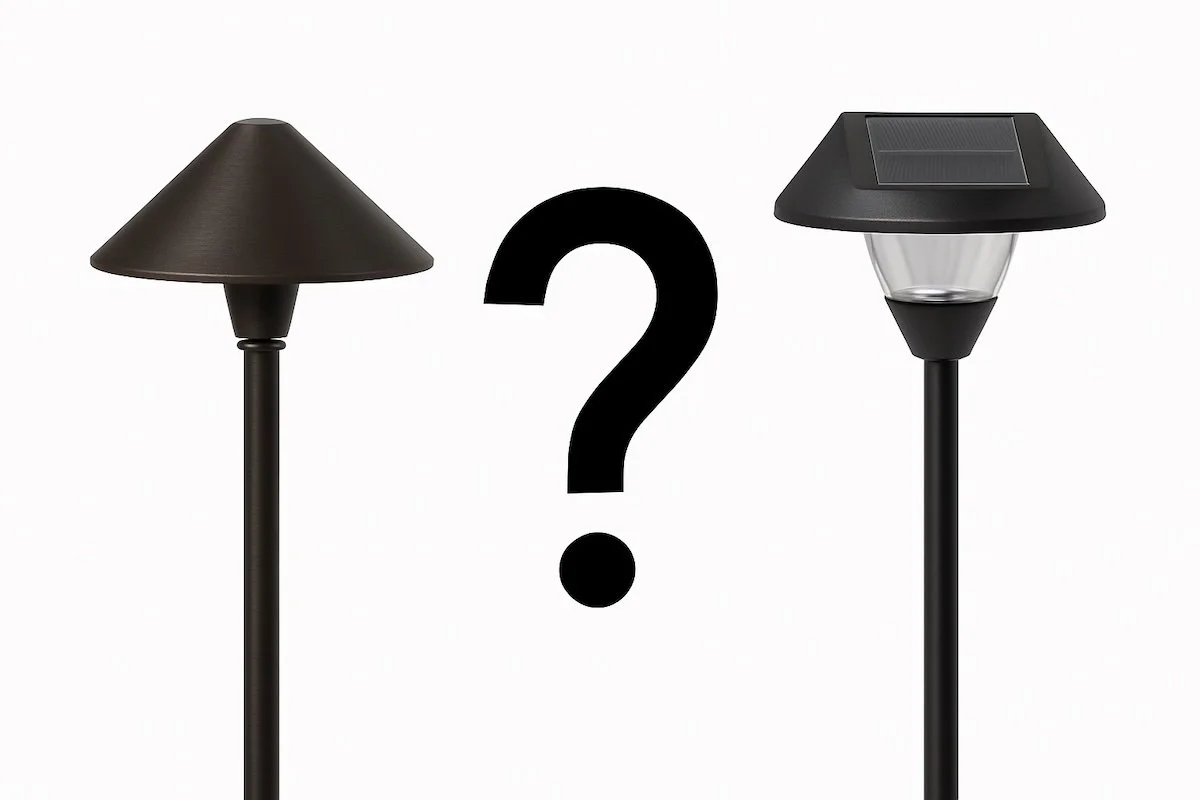Should I Use Low-Voltage or Solar Landscape Lighting?
Outdoor lighting adds safety, beauty, and value to your home, but choosing the right system makes all the difference. Many homeowners ask: should I use low-voltage or solar landscape lighting?
While solar lighting has become popular for its convenience, low-voltage lighting remains the clear winner in brightness, reliability, and longevity. Let’s compare the two so you can make the best decision for your yard.
What Is Low-Voltage Landscape Lighting?
Low-voltage lighting runs on 12 volts of electricity and connects through a transformer that reduces household current for outdoor use. It’s the same system professionals use for long-lasting, high-quality results.
Advantages of Low-Voltage Lighting:
Bright and consistent: Delivers steady illumination every night, regardless of weather.
Reliable: Won’t dim after a few cloudy days or die early in the evening.
Durable: Quality fixtures can last 10–15 years with minimal maintenance.
Flexible design: Ideal for large yards, driveways, or layered lighting plans.
Smart options: Compatible with timers, dimmers, and app controls.
Considerations:
Requires wiring and a transformer setup (often installed by a pro).
Slightly higher upfront cost, but lower long-term maintenance and replacement expenses.
Best For: Homeowners who want a permanent, high-performance lighting system that adds safety, security, and curb appeal.
What Is Solar Landscape Lighting?
Solar lights rely on built-in panels that charge batteries during the day and power LEDs at night. They’re simple to install and can work well for small decorative areas.
Advantages of Solar Lighting:
Easy to install; no wiring required.
Powered by free, renewable energy.
Affordable entry point for small projects.
Drawbacks of Solar Lighting:
Unreliable brightness: Output depends entirely on sunlight, which varies by location and season.
Shorter lifespan: Batteries typically need replacement every one to two years.
Inconsistent performance: Lights often dim or turn off early on cloudy or short winter days.
Limited design flexibility: Works best for accent lighting, not for illuminating large areas.
Best For: Small garden beds or decorative accents where consistent light isn’t critical.
Why Low-Voltage Lighting Is the Better Choice
1. Brighter, Safer, and More Functional
Low-voltage systems deliver even, powerful light that enhances visibility for walkways, patios, and driveways. This makes your yard safer for guests and deters potential intruders.
2. Reliable in Every Season
Rain, snow, or shade don’t affect performance. Unlike solar fixtures, low-voltage lights run perfectly every night, no matter the weather.
3. Built to Last
Solar fixtures are often made from lightweight plastic and last only a few years. Low-voltage systems use durable metals like brass or copper and can perform beautifully for over a decade.
4. Expandable and Customizable
Once installed, low-voltage systems can easily grow with your landscape. You can add new fixtures, switch beam angles, or integrate smart controls without replacing the whole setup.
5. Long-Term Value
While the upfront cost is higher, low-voltage lighting quickly pays off through superior performance, durability, and energy efficiency. With LED technology, operating costs stay incredibly low.
When Solar Lights Might Make Sense
Solar lighting can still be useful for:
Temporary or decorative setups like garden parties or pathways.
Small yards that get consistent, direct sunlight.
Homeowners who prefer a DIY, no-wiring solution for accent lighting.
If your goal is professional-quality lighting that lasts, though, solar is better as a supplement rather than a main system.
Conclusion: Choose Low-Voltage for Long-Term Quality
When comparing solar to low-voltage lighting, the choice comes down to performance versus convenience. Solar lights are easy to install and inexpensive upfront, but they often disappoint when it comes to brightness and reliability.
Low-voltage landscape lighting is the professional standard for a reason. It offers consistent illumination, better control, longer lifespan, and true return on investment.
If you want lighting that enhances your home’s beauty, safety, and value for years to come, low-voltage is the way to go.
Ready to explore your options? Visit your local lighting showroom to see low-voltage systems in action and discover how professional-quality lighting can elevate your outdoor space.
FAQ
Why do low-voltage lights perform better than solar?
They use a consistent power source, so brightness and run time never depend on weather or daylight.
Are low-voltage systems expensive to run?
Not at all. With LED fixtures, operating costs are minimal—often just a few dollars per month.
Can I mix solar and low-voltage lighting?
Yes, but for the best overall effect, use low-voltage lighting for main areas and solar only for small decorative zones.

